Ready to unlock the World of Artificial Intelligence? Dive into these top platforms!
Want to learn AI but don't know where to start? This list of top AI learning platforms in 2025 makes it easy. Whether you're exploring AI for marketing, workflow automation, prompting LLMs, or tools like Replit, n8n, and Zapier, we've got you covered. Find the perfect platform to boost your AI skills, from beginner-friendly courses to expert-level training. We'll also show you how VibeMakers integrates with these resources to create a powerful learning ecosystem. Explore these platforms and start your AI learning journey now!
1. VibeMakers
VibeMakers is an innovative AI learning platform designed specifically for non-technical individuals eager to dive into the world of artificial intelligence. Whether you're an AI enthusiast, a hobbyist looking to explore new creative avenues, or a professional seeking to enhance your career with AI skills, VibeMakers offers a supportive and vibrant community to accelerate your learning journey. This platform focuses on practical application and provides a bridge between creative thinking and AI innovation, making it a unique entry in the list of top AI learning platforms. It prioritizes empowering non-technical users to leverage AI tools and resources for real-world projects, distinguishing it from platforms that cater primarily to seasoned programmers and engineers.
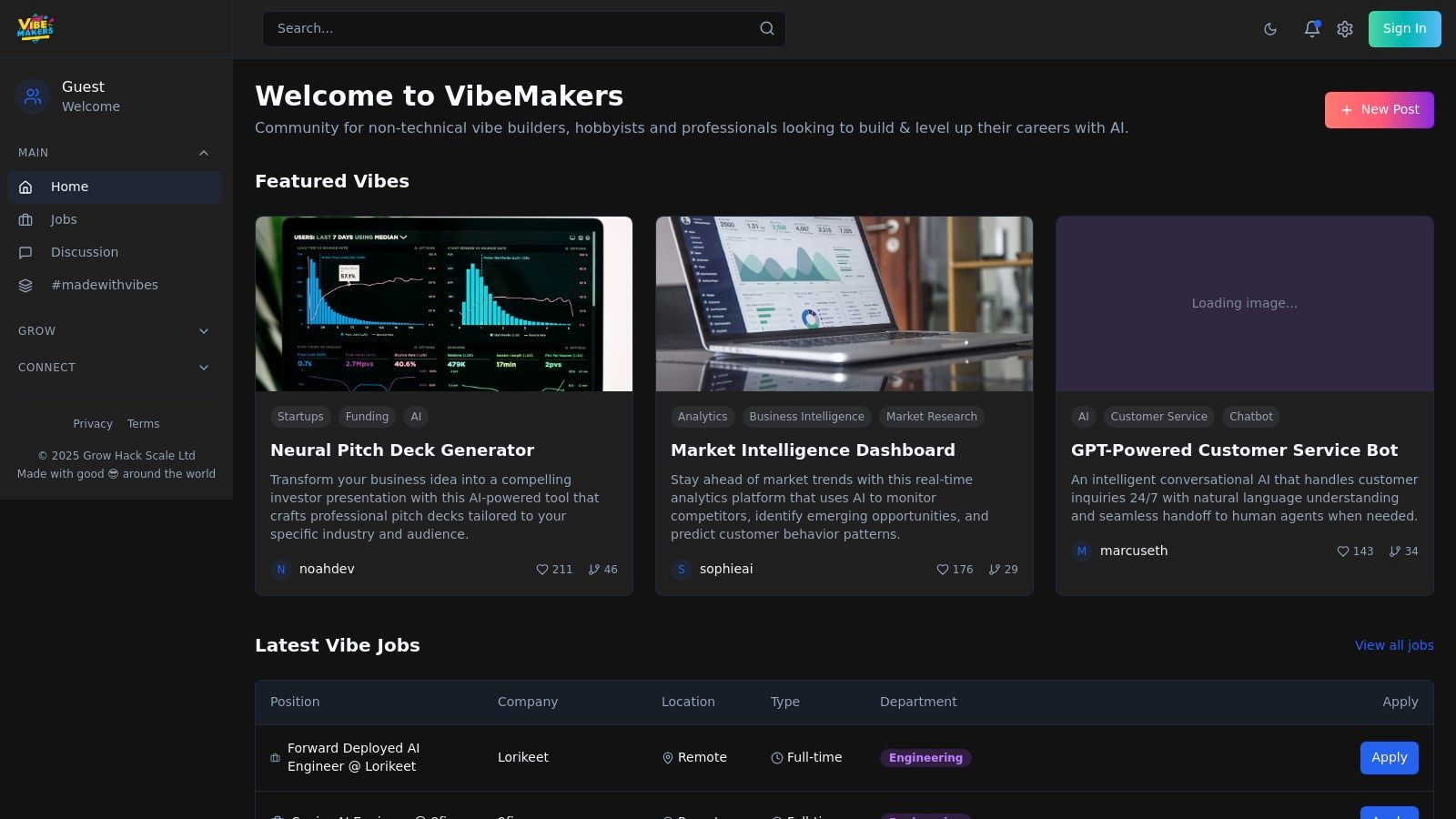
VibeMakers stands out with its focus on community and practical tools. Instead of just theoretical learning, members gain access to AI-powered resources designed for real-world impact. Imagine effortlessly creating compelling investor presentations with the Neural Pitch Deck Generator or staying ahead of market trends using the Market Intelligence Dashboard. Even building a GPT-Powered Customer Service Bot to enhance your business becomes accessible through the platform’s resources and collaborative environment. They even delve into specific use cases like LangChain for crafting effective customer journeys, showcasing the platform's commitment to practical application.
For those seeking career advancement, VibeMakers provides curated job listings focused on remote AI-related roles, further emphasizing its commitment to supporting its members' professional growth. Monthly one-on-one coaching sessions offer personalized guidance, while exclusive discounts from AI partners provide access to premium resources. VibeMakers fosters a learning environment that encourages experimentation and collaboration with other community members, creating a hive of activity around AI-driven projects.
Pros:
- Inclusive and supportive community: Specifically designed for non-technical AI enthusiasts and creators.
- Practical workshops and coaching: Access to exclusive workshops, real-time events, and personalized monthly coaching sessions.
- Innovative AI tools: Hands-on experience with tools like the Neural Pitch Deck Generator and Market Intelligence Dashboard.
- Career-focused resources: Curated job listings for remote AI roles and connections to potential employers.
- Exclusive partner discounts: Access to premium resources and tools at discounted rates.
Cons:
- Pricing not readily available: Requires prospective members to inquire directly about membership costs.
- Focus on non-technical users: May not provide the technical depth required by experienced AI engineers.
While the pricing details aren't publicly available, the unique blend of community support, practical AI tools, and career-focused resources makes VibeMakers a compelling choice for anyone wanting to explore the potential of AI. If you're looking to break into the AI world without a technical background, VibeMakers provides the tools, community, and support you need. You can explore more and request information on pricing at their website: https://vibemakers.ai
2. Coursera
Coursera stands out as a premier ai learning platform, partnering with renowned universities and tech giants like Stanford, Google, and IBM. This collaboration translates to high-quality AI and machine learning courses catering to all skill levels, from absolute beginners to seasoned professionals. What sets Coursera apart is its focus on both theoretical foundations and practical applications, empowering learners to not just understand AI concepts but also apply them in real-world scenarios. Whether you're a hobbyist vibe builder exploring AI for go-to-market strategies, or a non-technical AI enthusiast interested in prompting LLMs, Coursera likely has a learning path suited for your needs. You can find everything from introductory courses on AI fundamentals to specialized programs focusing on specific areas like natural language processing, computer vision, and deep learning. This blend of academic rigor and practical application makes it a powerful platform for anyone looking to build a solid foundation in AI or enhance their existing skills. For those just starting their AI journey, you might find this article helpful: Learn more about Coursera.

Coursera's structured learning paths, often culminating in professional certificates, are a significant draw. These certificates, recognized in the industry, can bolster your resume and demonstrate your commitment to continuous learning in the rapidly evolving field of AI. For example, you could pursue a specialization in "Deep Learning" by deeplearning.ai, gaining practical experience through hands-on projects and programming assignments using simplified datasets. Imagine using these newfound skills to automate parts of your vibe marketing workflow with tools like Zapier, n8n, or even building custom solutions on Replit. These specializations bridge the gap between theoretical knowledge and practical application, allowing you to experiment with AI tools and techniques relevant to your interests.
While Coursera offers a wealth of free content, access to graded assignments, projects, and certificates usually requires a subscription, ranging from $39 to $79 per month. This freemium model allows you to explore introductory material before committing to a paid specialization. Some courses adhere to a fixed schedule with deadlines, while others offer self-paced learning, providing flexibility for learners with varying time commitments. The platform also provides financial aid options, making its valuable resources accessible to a wider audience. While the academic rigor can be challenging for beginners, the structured curriculum, peer-reviewed assignments, and community forums provide ample support. Coursera's focus on practical application, combined with its partnerships with leading institutions, positions it as a valuable resource for anyone looking to understand and utilize AI in their work or personal projects. If you're looking for a comprehensive and structured approach to learning AI, Coursera is definitely worth exploring. Visit the Coursera website to discover the diverse range of AI specializations they offer.
3. DataCamp: Hands-on AI Learning for Everyone
DataCamp stands out among AI learning platforms thanks to its interactive, hands-on approach to teaching data science and AI skills. Whether you're a non-technical AI enthusiast, a hobbyist vibe builder, or exploring AI for go-to-market strategies, DataCamp's curriculum offers a practical pathway to understanding and applying these powerful technologies. Their focus on learning by doing, coupled with a user-friendly interface and bite-sized lessons, makes it perfect for beginners looking to quickly grasp key concepts and build practical skills. You'll find courses covering a wide range of topics relevant to various AI use cases, from prompting LLMs and implementing AI workflow automations to exploring Replit, n8n, and Zapier use cases.
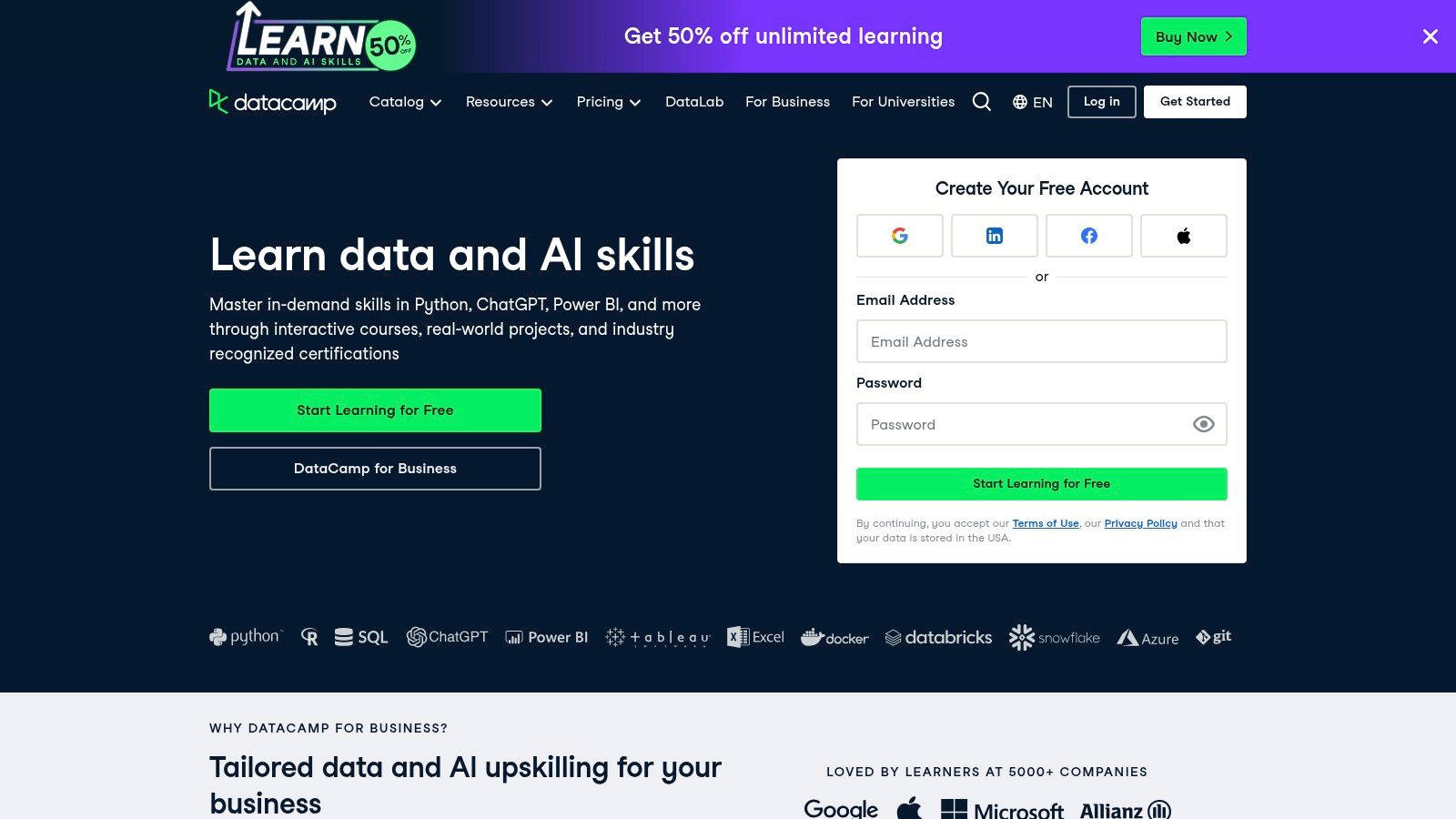
DataCamp's strength lies in its learn-by-doing methodology. Instead of passively watching lectures, you’ll actively code in their browser-based environment, receiving immediate feedback and reinforcing your learning. Short video lectures introduce concepts, immediately followed by interactive coding exercises that let you apply what you’ve learned. This approach is particularly beneficial for those new to coding and AI concepts, enabling them to gradually build confidence and proficiency.
The platform offers skill and career tracks focusing on different AI specializations, allowing you to tailor your learning path to specific goals, whether it's mastering Python for machine learning, diving into SQL for data analysis, or exploring specific AI libraries for your projects. Real-world projects further solidify your understanding and help you build a portfolio to showcase your newfound AI skills. A convenient mobile app also allows for learning on the go, fitting seamlessly into busy schedules.
While DataCamp excels in practical application, it’s important to be aware of its subscription model. Access to the full curriculum requires a monthly subscription ranging from $25 to $33, though the first chapter of each course is available for free, giving you a taste of the learning experience. While not as theoretically deep as a university course, DataCamp prioritizes industry-relevant tools and techniques, making it a valuable resource for those seeking practical AI skills for immediate application. Some advanced topics might not be covered as comprehensively, so if you're aiming for deep theoretical knowledge, supplemental resources might be beneficial.
Implementation/Setup Tips:
- Start with the free chapters: Explore the first chapter of various courses to find a topic that resonates with your interests and goals.
- Choose a skill or career track: Focus your learning and progress systematically through a curated curriculum.
- Leverage the mobile app: Maximize your learning time by completing exercises and watching videos on the go.
- Supplement with external resources: For deeper theoretical understanding, consider exploring academic papers and other online resources.
DataCamp earns its spot on this list of top AI learning platforms because of its user-friendly interface, interactive exercises, and focus on practical application. It’s an excellent choice for beginners and anyone seeking to quickly acquire and apply AI skills in various contexts, from vibe building and go-to-market strategies to automating workflows and exploring diverse AI use cases. Check out their offerings at https://www.datacamp.com.
4. Udacity
Udacity stands out among AI learning platforms for its focus on delivering cutting-edge, industry-relevant skills through its Nanodegree programs. These programs, built in partnership with giants like Google, AWS, and NVIDIA, delve into specialized AI fields such as deep learning, computer vision, and natural language processing. What sets Udacity apart is its commitment to practical application. You won't just learn theory; you'll build real-world projects and receive personalized feedback from technical mentors, ensuring you develop portfolio-ready skills. This hands-on approach makes it an excellent choice for those seeking to transition into a career in AI or upskill in their current roles.
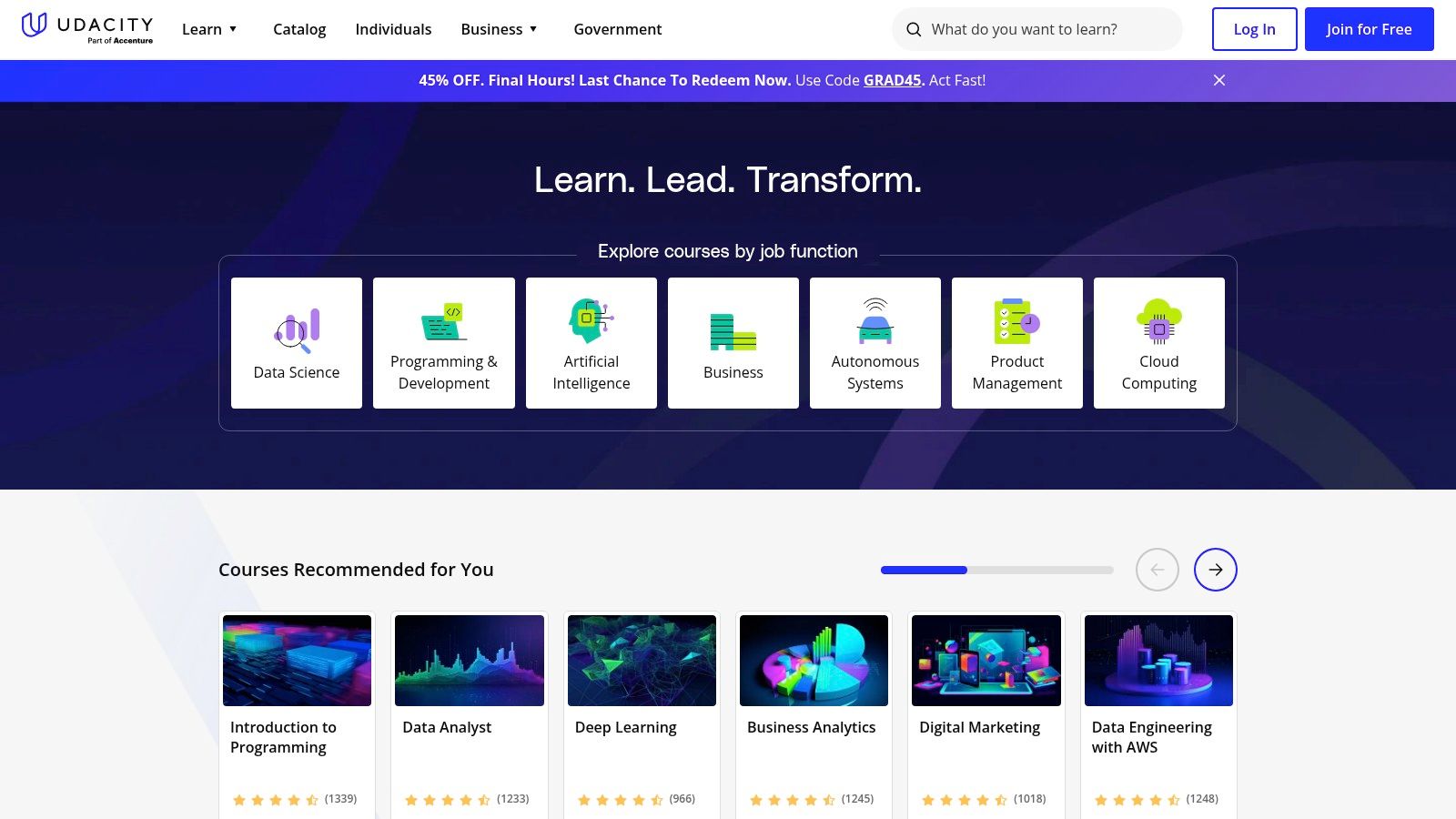
For those interested in exploring how AI can enhance workflows and go-to-market strategies, or perhaps even delve into prompting LLMs, Udacity offers a robust learning path. Imagine building an AI-powered tool for vibe marketing, automating repetitive tasks in your workflow, or even crafting effective prompts for AI tools like Replit, n8n, or Zapier. Udacity's Nanodegrees provide the foundational knowledge and practical skills needed to bring these ideas to life. While the platform may assume some prior programming knowledge for many of its AI courses, the comprehensive curriculum, coupled with technical mentorship and code reviews, creates a supportive environment for learners to thrive.
Udacity's structure revolves around project-based learning, allowing you to apply theoretical knowledge to practical scenarios. This focus on real-world application is further reinforced by career services and portfolio development support, helping you translate your newfound skills into tangible career opportunities. Think about using your newly acquired AI skills for optimizing go-to-market strategies, creating dynamic vibe marketing campaigns, or perhaps even automating parts of your workflow with AI integrations through tools like Zapier.
The platform’s self-paced learning structure offers flexibility, although the in-depth nature of the Nanodegrees requires a significant time commitment. The pricing, at $399/month, places it at a higher price point compared to some other ai learning platforms, but the specialized curriculum, expert mentorship, and strong career support justify the investment for those serious about a career in AI. For those seeking to master specific, advanced AI techniques and build a robust portfolio, Udacity is a strong contender. While fewer beginner-friendly options exist, its deep dive into specialized topics caters to those looking to become experts in their chosen field.
Perhaps you’re interested in learning more about how to effectively interact with AI through prompting. Learn more about Udacity and explore the possibilities. You can also explore their website directly: https://www.udacity.com
5. edX: Dive Deep into AI with Top Universities
edX stands out among AI learning platforms for its academic rigor and prestigious pedigree. Born from a collaboration between Harvard and MIT, edX offers a rich catalog of AI and machine learning courses developed and taught by leading experts from renowned universities worldwide. This platform caters to learners seeking a deep understanding of AI fundamentals, from basic concepts to advanced specializations. Whether you’re a hobbyist looking to explore the fascinating world of AI or a professional aiming to enhance your go-to-market strategy with AI-powered insights, edX provides a structured pathway to build your knowledge.

Imagine learning the intricacies of deep learning directly from MIT professors or exploring the ethical implications of AI with Harvard scholars. edX makes this possible. The platform offers various learning formats, including individual courses, MicroMasters programs, and professional certificate programs, allowing you to tailor your learning experience to your specific goals. Want to boost your resume with a verified certificate from a top university? edX has you covered. Prefer to explore a subject at your own pace without the commitment of a graded program? The audit option allows free access to most course materials, enabling you to sample the content before deciding to pursue a certificate.
For those interested in integrating AI into their workflows, edX provides a solid foundation. While the platform may not be as explicitly industry-focused as some bootcamp-style platforms, the theoretical depth offered by edX can be invaluable for understanding the “why” behind the AI tools and techniques used in platforms like Replit, n8n, and Zapier. This understanding can empower you to develop more effective prompts for LLMs, design robust AI-driven automations, and unlock new possibilities in your vibe marketing strategies.
Features and Benefits:
- University-level courses: Learn from world-renowned experts at prestigious institutions.
- Free audit option: Explore course materials without financial commitment.
- MicroMasters programs: Earn credits that can count towards select master's degrees.
- Rigorous assessments: Test your knowledge and practical skills through assignments and projects.
- Global learning community: Connect with fellow learners in discussion forums.
Pricing: While auditing courses is free, verified certificates and graded assignments require payment, typically ranging from $50 to $300 per course. MicroMasters programs involve a higher investment.
Technical Requirements: Generally, a stable internet connection and a computer capable of running a modern web browser are sufficient. Some courses may require specific software, which is usually detailed in the course description.
Pros and Cons:
Pros:
- Academic rigor and strong theoretical foundations.
- Free access to course materials through the audit option.
- Structured learning path from fundamentals to advanced topics.
- Verified certificates from respected universities.
Cons:
- Cost associated with certificates and graded assignments.
- Less directly industry-focused than some competitors.
- Requires a significant time commitment.
- Some courses adhere to fixed schedules.
Website: https://www.edx.org
edX deserves a spot on this list because it offers a unique blend of academic excellence and accessibility. For those seeking a deep and comprehensive understanding of AI, edX provides an unparalleled learning experience, empowering you to not just use AI tools but to truly understand the principles behind them. This makes it a valuable resource for anyone, from AI enthusiasts exploring the field to professionals seeking to integrate AI into their work, regardless of their technical background.
6. Pluralsight: Upskill Your AI Prowess for the Real World
Pluralsight earns its spot on this list of top AI learning platforms thanks to its career-focused approach to AI education. If you're a working professional looking to boost your AI skillset for practical application, or a hobbyist aiming to build serious projects, Pluralsight might be the perfect platform to level up. This platform caters specifically to technology professionals, offering a comprehensive library of courses spanning the breadth and depth of AI and machine learning.
What sets Pluralsight apart is its emphasis on practical implementation. It's not just about theoretical concepts; it's about equipping you with the skills to actually use AI in real-world scenarios – whether that's building an AI-powered feature for your startup, automating a workflow with machine learning, or getting to grips with prompting LLMs for powerful results.
How Pluralsight Works Its Magic:
- Skill IQ Assessments: Before you even begin a course, Pluralsight helps you pinpoint your existing knowledge gaps with its Skill IQ assessments. This personalized approach ensures you focus on the areas where you need the most improvement, optimizing your learning journey. Think of it as a roadmap for your AI education.
- Role-Based Learning Paths: Whether you're aspiring to be an AI engineer, a data scientist, or simply want to integrate AI into your existing role, Pluralsight offers structured learning paths tailored to specific professional roles. This curated approach provides a clear progression from foundational concepts to advanced techniques.
- Hands-on Labs: Theory is great, but practical experience is essential. Pluralsight provides hands-on labs that allow you to apply what you learn in a simulated environment, giving you the confidence to tackle real-world projects. This is invaluable for anyone looking to build tangible AI skills.
- Interactive Courses & Coding Challenges: Keep your learning engaging with interactive courses and coding challenges that reinforce key concepts. This active learning approach helps solidify your understanding and prepares you for the challenges of implementing AI in practical scenarios.
- Offline Viewing: Busy schedule? Download your courses and learn on the go, even without internet access. This flexibility is a major plus for working professionals and busy hobbyists.
What Makes Pluralsight Shine (Pros):
- Content Designed for Working Professionals: The courses are tailored for those seeking to apply AI in a professional setting, making it a great resource for career advancement.
- Strong Focus on Practical Implementation: You'll learn how to actually use AI tools and frameworks, not just the theory behind them. This is essential for anyone aiming to build real-world AI applications.
- Regular Updates: The AI landscape is constantly evolving. Pluralsight keeps its content up-to-date with the latest AI frameworks, tools, and technologies, ensuring you learn relevant skills.
- Extensive Library: From fundamental concepts to cutting-edge techniques, Pluralsight covers a vast range of AI topics and frameworks, allowing you to explore different areas and specialize in your chosen field.
Where Pluralsight Falls Short (Cons):
- Subscription Required: Access to all content requires a monthly subscription, ranging from $29 to $45. While this may be an investment, consider it an investment in your career.
- Less Suitable for Academic Learners: The focus on practical application may not be ideal for those seeking a more theoretical, academic approach to AI.
- Prior Knowledge Sometimes Assumed: Some advanced courses may assume a significant level of prior knowledge in programming and mathematics. Be sure to check the prerequisites before diving into complex topics.
- Limited Community Interaction: While the platform is rich in content, it lacks the vibrant community features found in some other learning platforms.
Pricing and Technical Requirements:
Pluralsight operates on a subscription model with plans ranging from $29 to $45 per month. Technical requirements vary depending on the specific courses and labs, but generally involve a modern web browser and, for some courses, specific software installations (which are usually clearly outlined in the course description).
Pluralsight vs. Other Platforms:
Compared to platforms like Coursera or edX, which offer a mix of academic and professional courses, Pluralsight is laser-focused on practical application for working professionals. If you're seeking university-style learning, those might be a better fit. However, if your goal is to gain job-ready AI skills, Pluralsight's specialized approach is hard to beat.
Getting Started with Pluralsight:
Head over to https://www.pluralsight.com to explore their course catalog and find the perfect learning path for your AI goals. Consider taking a Skill IQ assessment to identify your current skill level and personalize your learning experience.
Pluralsight is a powerful tool for anyone serious about using AI in a professional context. Its practical focus, combined with its constantly updated library and structured learning paths, makes it an excellent choice for non-technical enthusiasts, hobbyists, and seasoned professionals alike looking to leverage the power of AI.
7. Fast.ai
Fast.ai stands out among AI learning platforms by offering a unique, top-down teaching methodology. Instead of getting bogged down in complex mathematical theory, Fast.ai emphasizes practical application from the start. This approach makes it significantly easier for programmers and even non-programmers with some coding experience to grasp complex deep learning concepts and quickly build functional AI applications. It's a fantastic resource for those seeking practical AI skills for vibe marketing, go-to-market strategies, workflow automation, or even just exploring the possibilities of prompting Large Language Models (LLMs).
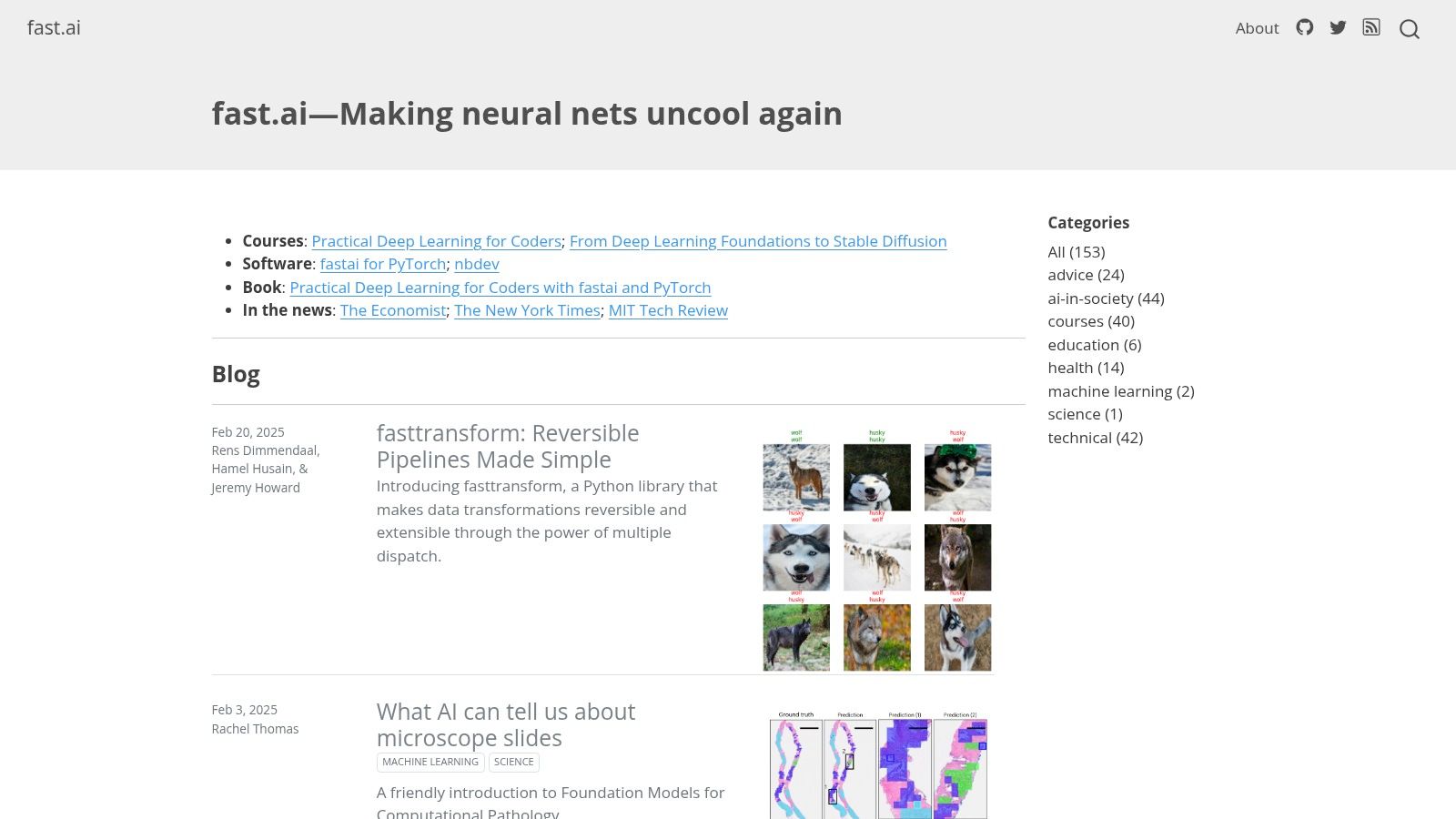
Imagine building your own image classifier to analyze product photos for your vibe marketing campaign, or training a model to automate parts of your go-to-market workflow. Fast.ai empowers you to do just that, even without a PhD in mathematics. The platform’s open courses use the popular PyTorch framework and focus on state-of-the-art techniques gleaned from recent research, allowing you to build cutting-edge AI solutions. This practical, hands-on learning is complemented by an active community forum offering support and guidance, fostering a collaborative learning environment. The platform provides open-source libraries that simplify deep learning implementation, further lowering the barrier to entry.
For those interested in exploring other AI tools, especially if you're a non-programmer, you might find this resource helpful: Learn more about Fast.ai. It covers various tools that could complement your Fast.ai learning journey and expand your AI toolkit.
One of the best parts? Fast.ai is completely free! This removes a significant barrier for hobbyists, vibe builders, and anyone exploring AI’s potential. While commercial platforms may offer more structured learning paths, Fast.ai's free access and practical approach make it an invaluable resource among ai learning platforms. This open access aligns perfectly with the ethos of accessibility, empowering anyone with the drive to learn to dive into the world of AI.
Key Features and Benefits:
- Free and Open Access: No subscription fees or hidden costs.
- Top-Down Approach: Learn by doing, focusing on practical applications before delving into theory.
- Cutting-Edge Techniques: Stay up-to-date with the latest advancements in deep learning.
- Active Community: Benefit from a supportive network of learners and practitioners.
- PyTorch Integration: Learn and build with a widely used and powerful deep learning framework.
- Open-Source Libraries: Simplify the implementation of complex deep learning tasks.
Pros:
- Completely free and open access.
- Practical approach makes advanced AI accessible to a broader audience.
- Teaches cutting-edge techniques used in current research.
- Strong and active community.
Cons:
- Less structured learning experience than paid platforms.
- Requires self-motivation and independent learning.
- Assumes some basic programming knowledge (Python is recommended).
- Fewer courses compared to larger platforms.
Website: https://www.fast.ai
Implementation Tips:
- Start with the introductory course to get a feel for the platform's teaching style.
- Leverage the community forums for help and support.
- Experiment with the provided code examples and adapt them to your own projects.
- Focus on building projects that align with your interests, whether it's vibe marketing, workflow automation, or something completely different. This will keep you motivated and help you solidify your learning.
Fast.ai deserves its place on this list of ai learning platforms due to its unique combination of free access, practical focus, and cutting-edge content. It's an ideal starting point for anyone eager to explore the world of deep learning and apply it to real-world problems, especially in areas like vibe building, go-to-market strategies, and workflow automations.
8. DeepLearning.AI
DeepLearning.AI, founded by AI luminary Andrew Ng, stands out among AI learning platforms for its specialized focus on deep learning. Whether you're a non-technical AI enthusiast, a hobbyist vibe builder looking to integrate AI into your workflow, or exploring AI for go-to-market strategies, DeepLearning.AI offers a structured path to understanding and applying this transformative technology. It makes complex AI concepts accessible even to those without a deep mathematical background, while still providing the technical depth needed for practical application. This makes it an ideal platform for individuals wanting to bridge the AI skills gap and leverage the power of AI in various fields, from marketing and prompt engineering for LLMs to workflow automation using tools like Replit, n8n, and Zapier. Learn more about DeepLearning.AI as a key player in addressing the widening demand for AI expertise.
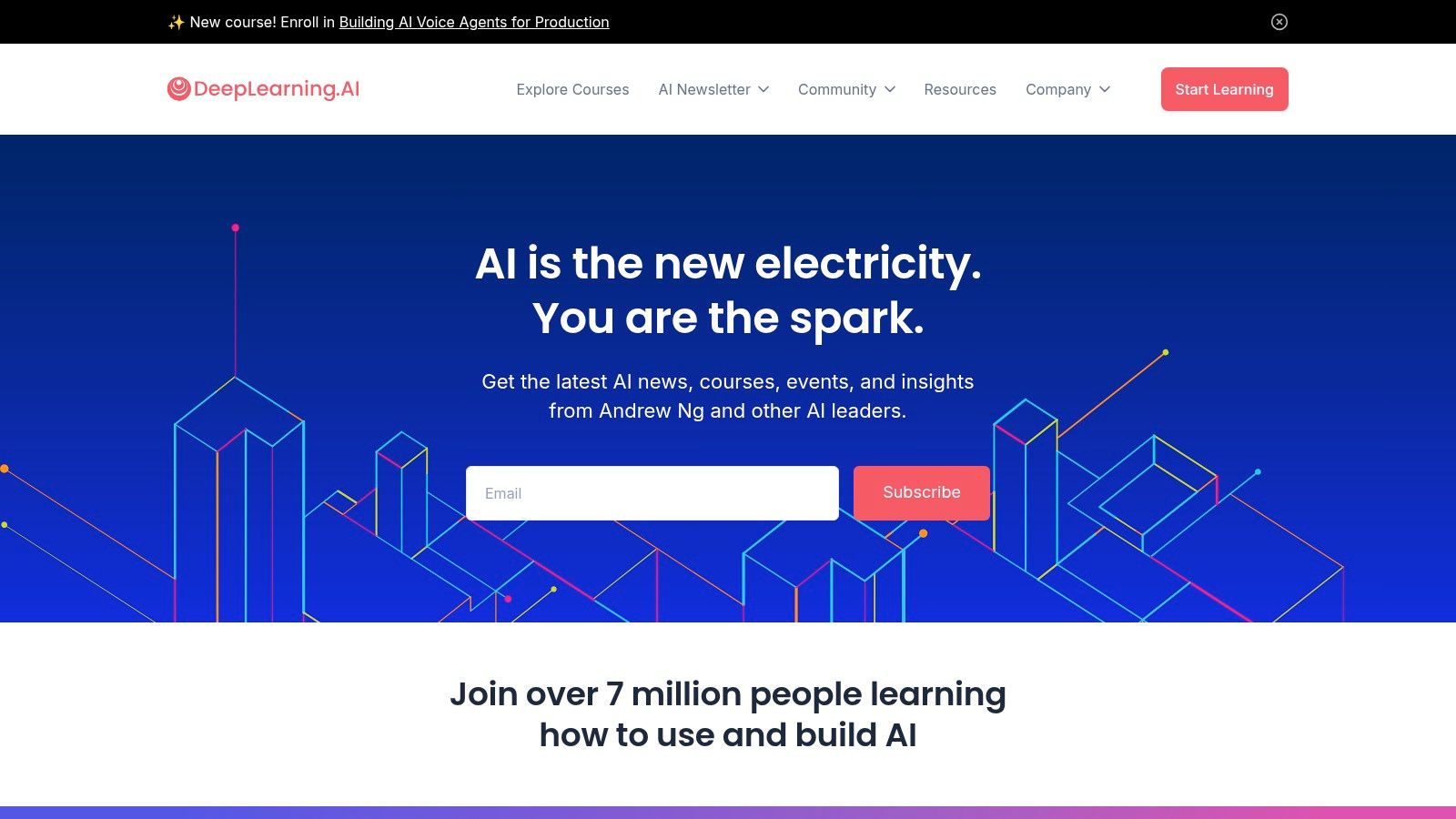
DeepLearning.AI's curriculum progresses from foundational concepts to advanced topics, allowing learners to build a solid understanding of deep learning principles. Specializations are often taught by leading AI researchers, offering a unique opportunity to learn from the best in the field. Practical application is emphasized through programming assignments with guided implementations, integrating popular frameworks like TensorFlow and PyTorch. Imagine building your own image recognition model for vibe marketing, or using AI to automate parts of your go-to-market strategy – DeepLearning.AI gives you the tools and knowledge to make these ideas a reality.
Features:
- Specializations taught by leading AI researchers
- Structured learning path from fundamentals to advanced topics
- Hands-on programming assignments with guided implementations
- Integration with TensorFlow, PyTorch, and other frameworks
- Industry-recognized certificate programs
Pros:
- Expert instruction from Andrew Ng and other AI leaders
- Clear explanations of complex mathematical concepts
- Strong emphasis on practical implementation and real-world use cases
- Courses updated to reflect the latest AI advancements
Cons:
- Most content requires a Coursera subscription (pricing varies depending on the specialization)
- Some specializations demand a significant time investment
- Projects can be simplified for educational purposes, potentially limiting real-world complexity
- Assumes some familiarity with basic programming concepts
Implementation/Setup Tips:
While DeepLearning.AI assumes some basic programming knowledge, don't let this intimidate you. Many resources are available online to help you brush up on these skills. Start with a foundational specialization and leverage the platform’s structured approach. The guided implementations within the programming assignments are particularly helpful for beginners.
DeepLearning.AI earns its spot on this list by providing a high-quality, accessible, and practical approach to learning deep learning. Its focus on real-world application makes it an excellent choice for anyone looking to leverage AI in their projects, whether it's optimizing a vibe marketing campaign or automating tasks in your AI-powered workflow. The platform’s link with Coursera also provides access to a broader learning ecosystem, further enhancing its value as a top-tier AI learning platform. Visit the DeepLearning.AI website to explore the various specializations and start your AI journey today.
9. LinkedIn Learning
Looking to boost your career with AI skills or simply understand how this transformative technology is impacting businesses? LinkedIn Learning, formerly Lynda.com, is a strong contender among AI learning platforms, particularly for professionals seeking practical knowledge and career advancement. It offers a wealth of courses spanning a broad range of AI and machine learning topics, from introductory concepts to more specialized areas like AI marketing and workflow automation. The platform shines in its focus on real-world applications, making it perfect for non-technical enthusiasts, hobbyist vibe builders, and those exploring AI for go-to-market strategies.
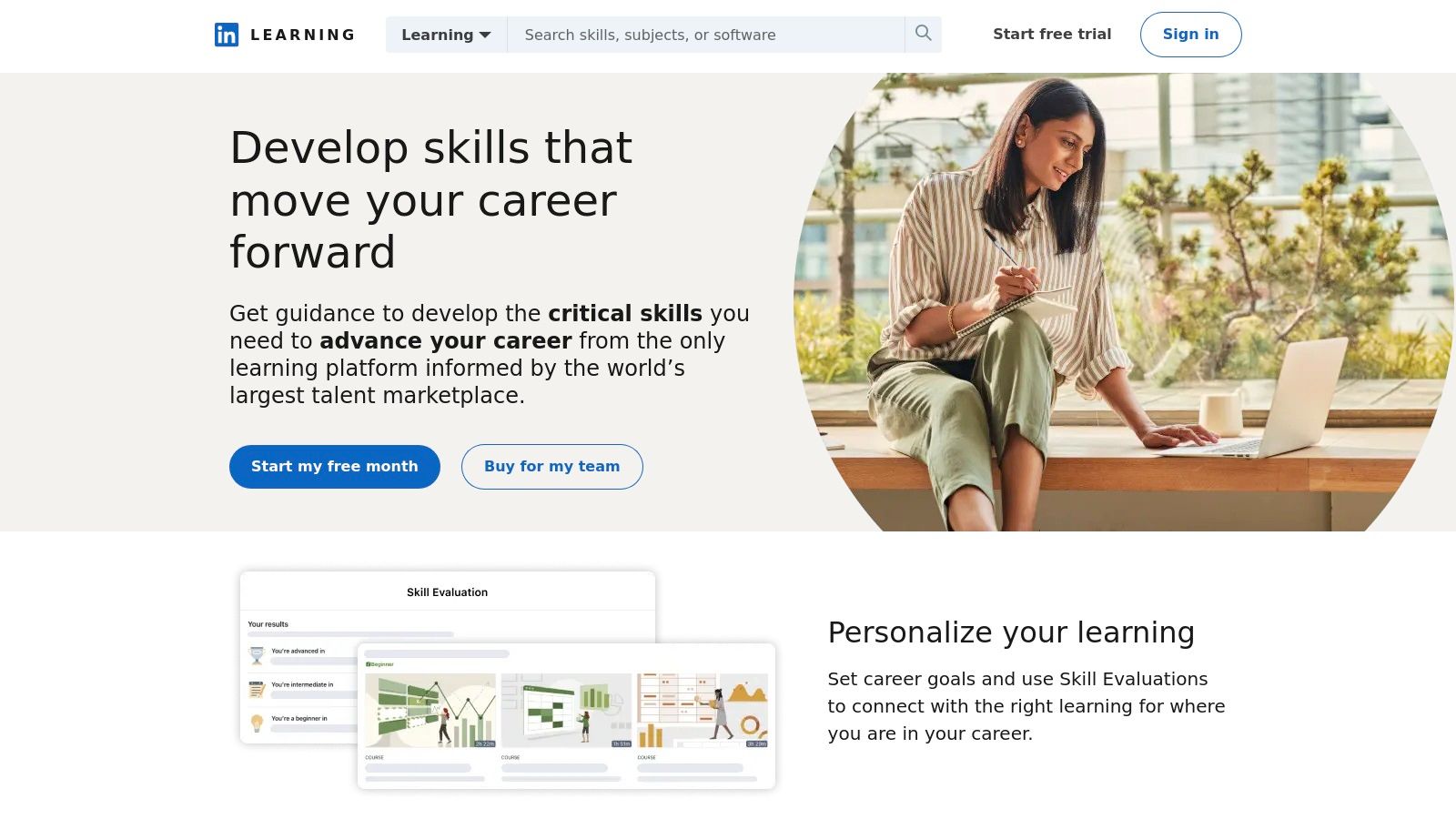
One of LinkedIn Learning's biggest strengths is its bite-sized, focused course structure. Busy professionals can easily fit these shorter modules into their schedules, gradually building their AI knowledge without feeling overwhelmed. Whether you're interested in understanding prompting for LLMs like ChatGPT, exploring Replit or n8n use cases for AI-powered automations, or leveraging Zapier for intelligent workflows, LinkedIn Learning has something to offer. You’ll find courses dedicated to understanding AI’s role in vibe marketing, go-to-market strategies, and even how to implement AI solutions in your workflow. This practicality distinguishes it from more academically-focused platforms, delivering readily applicable skills you can implement immediately.
For those looking to showcase their newfound AI expertise, LinkedIn Learning seamlessly integrates with your LinkedIn profile. Completed courses appear as verifiable skills, boosting your professional credibility and visibility to potential employers. Furthermore, the platform provides downloadable exercise files and resources, allowing you to practice what you've learned and build a portfolio. They also offer structured learning paths catering to specific AI career trajectories, helping you map out your professional development journey.
Features:
- Short, focused courses on specific AI technologies
- Integration with LinkedIn profile for showcasing skills
- Downloadable exercise files and resources
- Learning paths for different AI career trajectories
- Mobile and offline viewing options
Pros:
- Professional focus with emphasis on workplace applications
- Shorter courses ideal for busy professionals
- Wide range of topics covering many AI applications
- Often included with Premium LinkedIn subscriptions
Cons:
- Requires subscription ($29.99/month or annual plan)
- Less academic depth than university-partnered platforms
- Limited community interaction features
- Fewer advanced, cutting-edge AI topics
Website: https://www.linkedin.com/learning
While LinkedIn Learning might not delve into the theoretical depths of AI like some university-backed platforms, its practical approach and career-centric focus make it a valuable resource for anyone looking to leverage AI in their professional life. If you’re already a LinkedIn Premium subscriber, you might even have free access, making it an even more compelling option among AI learning platforms. Its emphasis on readily applicable skills, combined with the profile integration, makes it a powerful tool for building your AI expertise and advancing your career.
10. Kaggle
Kaggle stands out among AI learning platforms not as a traditional structured course provider, but as a vibrant hub where learning is intrinsically linked to practical application. While renowned for its data science competitions, Kaggle offers an invaluable collection of free courses covering machine learning, deep learning, and broader AI concepts. This platform ingeniously combines structured learning modules with hands-on practice through real-world datasets and engaging competitions, fostering a unique learn-by-doing environment. This makes it ideal for non-technical AI enthusiasts, hobbyist vibe builders and those interested in exploring AI for go-to-market strategies, workflow automations, or even prompting LLMs.
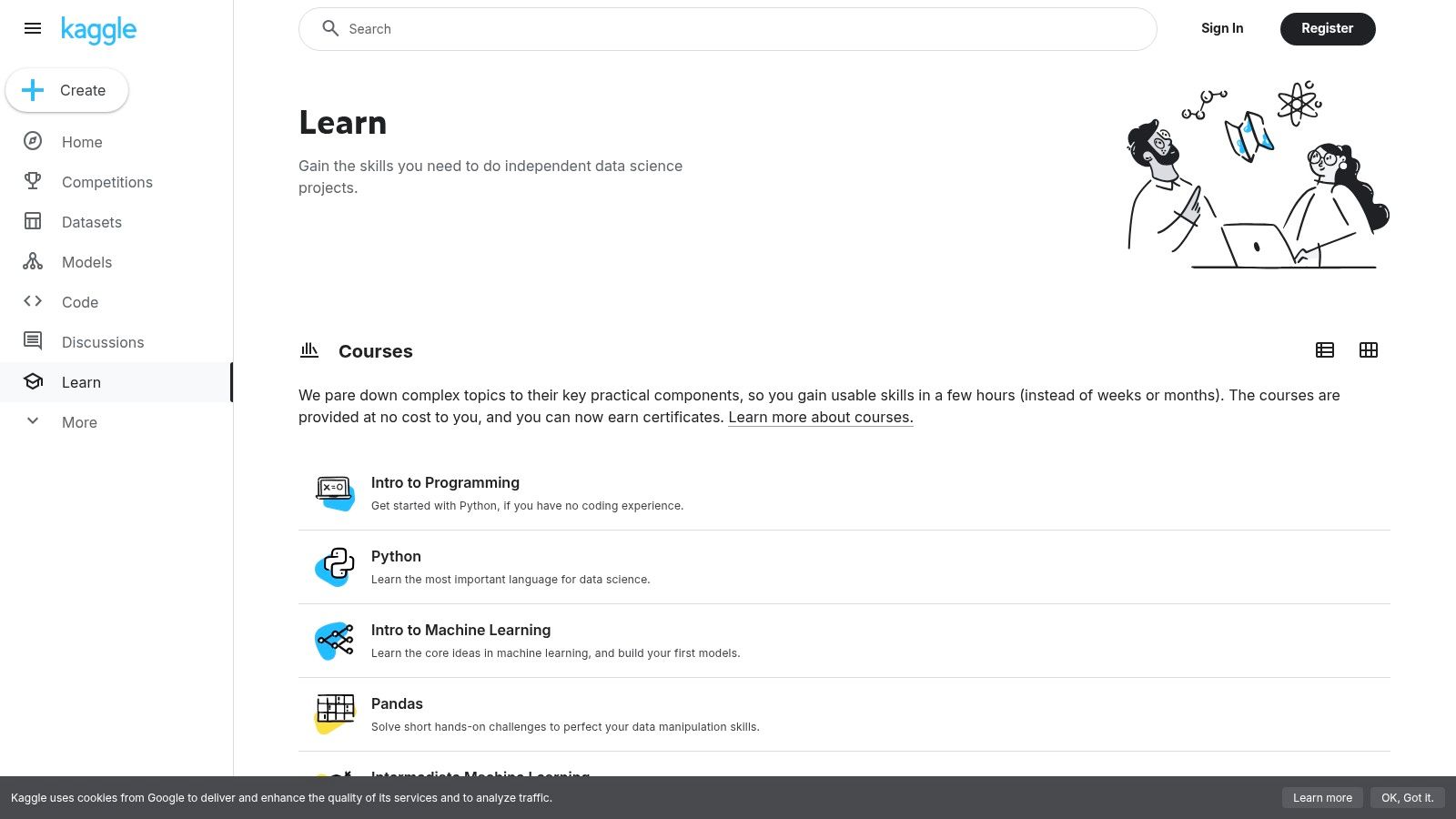
Imagine building a workflow automation using n8n or Zapier, fueled by the AI knowledge you've gleaned from a Kaggle course on machine learning. Or perhaps you're looking to improve your Replit projects by incorporating smarter algorithms learned through Kaggle's deep learning tutorials. The possibilities are vast. Kaggle allows you to directly apply these newly acquired skills to real-world problems, offering a bridge between theory and practice. For example, a budding vibe marketer could leverage Kaggle's datasets and learning resources to understand how AI can improve audience engagement and build stronger communities. Learn more about Kaggle and its community-building aspects.
Kaggle’s free courses provide fundamental knowledge and practical techniques in machine learning and AI. Learners utilize Jupyter notebooks, a popular environment for interactive coding, enabling them to experiment with real datasets directly within the platform. This focus on real-world applications makes Kaggle an attractive option for those looking to understand how AI can be used to solve practical problems. The active community forum fosters knowledge sharing and networking opportunities, allowing learners to connect with experienced AI practitioners and get feedback on their work.
Features:
- Free courses on machine learning fundamentals and advanced techniques.
- Jupyter notebook environment for hands-on practice.
- Access to a wide range of datasets for real-world applications.
- AI competitions with opportunities for prizes and recognition.
- Active community forums for networking and knowledge sharing.
Pros:
- Completely free learning resources.
- Learn-by-doing approach through competitions and projects.
- Vibrant community of AI practitioners.
- Direct application of skills to real-world problems.
Cons:
- Less structured learning experience compared to formal platforms.
- Limited breadth of AI topics compared to dedicated learning websites.
- The competitive environment might be intimidating for beginners.
- Requires self-direction and motivation.
Website: https://www.kaggle.com/learn
Kaggle deserves a place on this list of AI learning platforms because it provides a unique, practical, and free pathway to learning AI. It's a valuable resource for anyone seeking to move beyond theoretical knowledge and delve into the practical application of AI, particularly for those exploring the exciting intersections of AI and community building, go-to-market strategies, and workflow automation.
Top 10 AI Learning Platforms Comparison
| Platform | Core Features/Tools | User Experience & Quality | Value & Pricing | Target Audience | Unique Selling Points |
|---|---|---|---|---|---|
| 🏆 VibeMakers | Community hub, 1:1 coaching, AI tools (Pitch Deck, Dashboard) ✨ | Inclusive, supportive, dynamic discussions ★★★★ | Pricing undisclosed 💰 | 👥 Non-technical AI enthusiasts & pros | Monthly coaching, partner discounts ✨ |
| Coursera | University-backed AI courses, certificates | High-quality, peer-reviewed ★★★★ | $39-$79/month subscription 💰 | 👥 Learners seeking credentials | Top university & company partners |
| DataCamp | Interactive coding exercises, skill tracks | Hands-on, feedback-driven ★★★★ | $25-$33/month subscription 💰 | 👥 Beginners to intermediates | Browser-based coding environment |
| Udacity | Project-based Nanodegrees, mentorship | Advanced, expert feedback ★★★★ | $399/month Nanodegree 💰 | 👥 Advanced learners & pros | Industry-partnered Nanodegrees |
| edX | University-level courses, MicroMasters | Academic rigor, free audit option ★★★★ | $50-$300/course certificates 💰 | 👥 Academics & serious learners | Top-tier universities, audit free |
| Pluralsight | Skill IQs, role-based paths, labs | Professional, practical ★★★★ | $29-$45/month subscription 💰 | 👥 Tech professionals | Skill assessments, updated content |
| Fast.ai | Free PyTorch courses, top-down teaching | Practical, community-driven ★★★ | Free 💰 | 👥 Self-motivated programmers | Free, cutting-edge deep learning ✨ |
| DeepLearning.AI | Deep learning specializations, expert-led | Expert instruction, detailed ★★★★ | Subscription via Coursera 💰 | 👥 Intermediate to advanced | Andrew Ng founded, industry-recognized |
| LinkedIn Learning | Short professional AI courses, LinkedIn integration | Professional, flexible ★★★ | $29.99/month subscription 💰 | 👥 Career-focused learners | LinkedIn profile skill showcase |
| Kaggle | Free ML courses, competitions, datasets | Hands-on, community-driven ★★★ | Free 💰 | 👥 Data science practitioners | Competitions with prizes, real data |
Supercharge your AI Journey with Continuous Learning and Community
From beginner-friendly introductions to advanced specializations, the AI learning platforms we've explored – VibeMakers, Coursera, DataCamp, Udacity, edX, Pluralsight, Fast.ai, DeepLearning.AI, LinkedIn Learning, and Kaggle – offer a wealth of resources to kickstart your AI journey. The most important takeaway is that finding the right platform depends on your specific needs and learning style. Consider factors like the depth of content, hands-on projects, community interaction, and cost when making your decision. Are you interested in more practical applications and building your AI-powered workflows? Perhaps you're looking to leverage platforms like Replit, n8n, or Zapier for AI automation? Or maybe you're focusing on prompting LLMs effectively for your go-to-market strategy. No matter your focus, these platforms provide the foundation you need to succeed.
Looking for more AI tools beyond learning platforms to enhance your projects and explore further AI use cases? For instance, if you're exploring AI for vibe marketing and need more tools in your arsenal, check out this comprehensive comparison: Top 10 OpenAI Alternatives for 2025. This resource from MultitaskAI, Top 10 OpenAI Alternatives for 2025: AI Tools Compared, offers a valuable overview of different options.
The world of AI is dynamic, so continuous learning is key. Embrace these AI learning platforms as your springboard into the exciting world of artificial intelligence. Ready to connect with a thriving community, explore job opportunities, and take your AI skills to the next level? Join the VibeMakers community at VibeMakers and connect with fellow enthusiasts, participate in workshops, and transform your AI aspirations into tangible achievements. We're building a vibrant hub for everyone passionate about AI, so come and be a part of it!